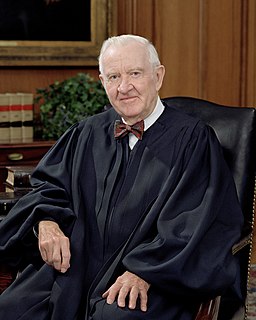A Quote by Antonin Scalia
Perhaps sensing the dismal failure of its efforts to show that 'established by the State' means 'established by the State or the Federal Government,' the Court tries to palm off the pertinent statutory phrase as "inartful drafting.' This Court, however, has no free-floating power 'to rescue Congress from its drafting errors.'
Related Quotes
When I joined the Supreme Court in 1975, both state and federal judges accepted the Court's unanimous decision in United States v. Miller as having established that the Second Amendment's protection of the right to bear arms was possessed only by members of the militia and applied only to weapons used by the militia.
It [the Constitution] didn't break free from the essential constraints that were placed by the founding fathers in the Constitution, at least as it's been interpreted, and the Warren court interpreted it in the same way that generally the Constitution is a charter of negative liberties. It says what the states can't do to you, it says what the federal government can't do to you, but it doesn't say what the federal government or the state government must do on your behalf. And that hasn't shifted.
I can't say that I was my happiest on court, but I felt completely free. Free from family obligations, free from my own torment. In a real sense I was a different person. It was a place where I could not tolerate the idea of being beaten. I psyched myself up into a state where I felt something close to hatred towards my opponent, a state where I detested the idea of someone making his name at the expense of Jimmy Connors. I was in my element on court, measuring myself against someone else. I was not competitive for show. It came from deep within.
The Obama administration came into Utah and said, 'We're not going to listen to what the U.S. Supreme Court said. 'We, the federal government, are going to recognize marriages in the state of Utah and Utah state law explicitly does not recognize as marriage,' and that was really, in my view, an abuse of power.
The Court's decision reflects the philosophy that judges should endure whatever interpretive distortions it takes in order to correct a supposed flaw in the statutory machinery. That philosophy ignores the American people's decision to give Congress '[a]ll legislative Powers' enumerated in the Constitution. They made Congress, not this Court, responsible for both making laws and mending them.
If the court strikes down the Defense of Marriage Act, is that a 'liberal' result enabling gay couples married in states where gay marriage is legal to enjoy the same economic advantages that federal laws now grant to straight couples? Or is it a 'conservative' ruling, limiting the federal government's ability to override state power?
Religious institutions that use government power in support of themselves and force their views on persons of other faiths, or of no faith, undermine all our civil rights. Moreover, state support of an established religion tends to make the clergy unresponsive to their own people, and leads to corruption within religion itself. Erecting the 'wall of separation between church and state,' therefore, is absolutely essential in a free society.
Gorsuch, who is a U.S. Supreme Court nominee in the United States, said the real test of law is when a government can lose in its own courts and still respect the order. And I think Canadian need to ask is why would Canada, if it's doing everything right, why wouldn't you want to be watched? If they are contesting the fact that their own courts don't have jurisdiction over the government's human rights violations, then our next step is to go to federal court and find the federal government that can come to court and we will do that.
































